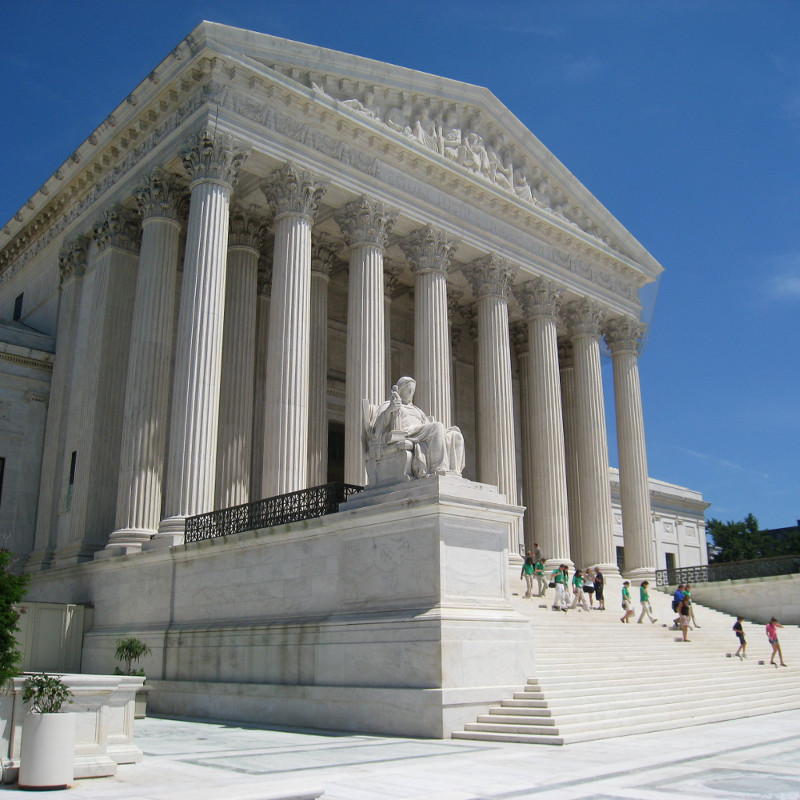The 21st Century National Security Constitution
Harold Hongju Koh 91 Geo. Wash. L. Rev. 1391 Even as the Biden Administration’s foreign policy unfolds, in 21st Century practice, foreign relations law seems to have largely become national security law. Virtually all foreign affairs issues have been reframed into national security terms. And because so much of foreign affairs law seems to have... Read More
Previews for the 2023 October Term of the Supreme Court
After a consequential two years in which the law of gun rights, substantive due process, religious liberty, and affirmative action, among others, was made anew, the Supreme Court's October 2023 Term features a wide array of cases that will refine the scope of its "history and tradition" approach in the Second Amendment context, contemplate the intersection of social media and the First Amendment, reconsider the foundations of the modern administrative state, and much more.
Drawing a Line: How Energy Law Can Provide a Practical Boundary for the Rapidly Expanding Major Questions Doctrine
Kyle Pasucci 91 Geo. Wash. L. Rev. 1360 Administrative agencies must respond to innovation in their field of expertise to keep their regulatory approach efficient and effective. However, the recent expansion of the major questions doctrine threatens to undermine agency capacity to respond to new technology and new practices. Recently, the Supreme Court has endorsed... Read More
Set Up to Fail: National Labor Relations Board
Mher Mkrtchian 91 Geo. Wash. L. Rev. 1330 The National Labor Relations Board (“NLRB”) can no longer be described as an independent agency. The structural separation of the agency’s adjudicative and prosecutorial powers under the Taft-Hartley Amendments to the Wagner Act effectively permits the General Counsel to control a lion’s share of the agency’s policymaking... Read More
Pharmaceutical Patents and Adversarial Examination
Dmitry Karshtedt 91 Geo. Wash. L. Rev. 1259 Proposals to improve the work quality of the U.S. Patent and Trademark Office (“PTO” or “USPTO”) continue to generate vigorous debate. On one hand, several scholars maintain that the short times allotted to the examination of patent applications and the agency’s other operational constraints yield numerous patents... Read More
Beyond APA Section 553: Hayek’s Two Problems and Rulemaking Innovations
Yoon-Ho Alex Lee 91 Geo. Wash. L. Rev. 1215 Section 553 of the Administrative Procedure Act of 1946 is hailed as “one of the greatest inventions of modern government.” One reason for this commendation is that section 553 addresses a fundamental problem in policy- making that is famously attributed to F.A. Hayek: the problem of... Read More
Nondelegation Blues
Philip Hamburger 91 Geo. Wash. L. Rev. 1083 The nondelegation doctrine is in crisis. For approximately a century, it has been the Supreme Court’s answer to questions about transfers of legislative power. But as became evident in Gundy v. United States, those answers are wearing thin. So, it is time for a new approach. This... Read More
The Court That Does Not Let Standing Stand in Its Way
Alan B. Morrison 92 Geo. Wash. L. Rev. Arguendo 1 Article III of the Constitution limits the power of the federal courts to adjudicating cases and controversies. Embedded in that concept are the separate and sometimes overlapping doctrines of standing, ripeness, political question, mootness, and the overall responsibility of the courts to assure both that... Read More
Is There a Light at The End of the Dark-Pattern Tunnel?
Lindsay Wilson 91 Geo. Wash. L. Rev. 1048 In the wake of the AMG Capital Management, LLC v. FTC Supreme Court decision which held that the Federal Trade Commission (“FTC”) does not have the authority to seek monetary relief and is limited to injunctive relief under section 13(b) of the Federal Trade Commission Act (“FTC... Read More
Two Hooligans Forever Barred: When the Immaterial Becomes Material
Olive Lee 91 Geo. Wash. L. Rev. 1009 As victims of persecution, war, and forcible displacement, refugees and asylees are unprotected by their own governments and depend on the compassionate response of others. The United States asylum system, in support of international human rights efforts and humanitarian ideals, offers protection to those fleeing persecution. However,... Read More

